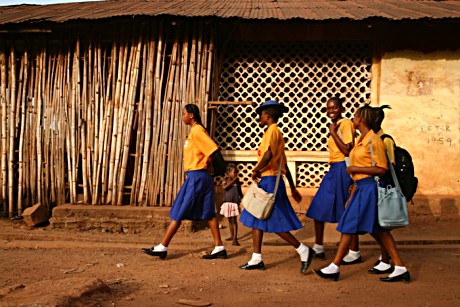
Teenage girls walk home from school in Makeni, Sierra Leone. Every year, some 270,000 women die from cervical cancer and another 500,000 receive a new diagnosis, mainly in developing countries. Safe and effective HPV (human papillomavirus) vaccines are available that can prevent 70% of cervical cancer cases. Source: Olivier Asselin/GAVI/2009.
Vaccines are a highly effective way to prevent communicable diseases. They also play a critical role in preventing the infections that cause certain cancers like liver and cervical cancers. In the past decade, more than 3 million future deaths from liver cancer have been prevented and 267 million additional children have been immunised with GAVI Alliance support. With full funding, the GAVI Alliance will also be able to support the introduction of human papillomavirus (HPV) vaccines against cervical cancer in the world's poorest countries.
Every year, more than seven million people die from cancer worldwide. It is a disease burden increasingly carried by developing countries. For many of the world's poorest people, weak health systems and poverty mean diagnosis and treatment are out of their reach and cancer is often a death sentence. Prevention and control are critical.
One in five cases of cancer is caused by infections like hepatitis B and human papillomavirus (HPV). Hepatitis B vaccine was the first vaccine developed to protect against a cancer. It protects against the hepatitis B infection that causes an estimated 600,000 deaths from liver cancer. Cervical cancer is the number one cause of cancer deaths in adult women in low-income countries. The disease kills 270,000 women each year, and over 80% of these deaths occur in the developing world. HPV vaccines protect against human papillomaviruses types 16 and 18 which cause about 70% of cervical cancer cases.
After the GAVI Alliance was launched in 2000, support for the introduction of hepatitis B vaccine spurred a spectacular uptake in the world's poorest countries. Within four years, half of low-income countries had introduced hepatitis B vaccines in national immunisation programmes. Now, 59 of the 72 GAVI-eligible countries have introduced hepatitis B vaccines in pentavalent, a 5-in-1 shot that combines hepatitis B with diphtheria, tetanus, pertussis, and Hib antigens.
The GAVI Alliance is a member of the Union for International Cancer Control (UICC). To mark the 100th anniversary of International Women's Day, the GAVI Alliance and UICC called for HPV vaccines to be made available to women and girls living in the poorest countries of the world.
In September 2011, world leaders will gather in New York for the first UN High-Level Summit on Non-Communicable Diseases (NCDs). The summit will focus global attention on the four leading non-communicable diseases, namely cancers, cardiovascular disease, chronic respiratory diseases and diabetes, and agree on a plan of action to address them. GAVI supports these global efforts to curb non-communicable diseases and strongly advocates for prevention, including immunisation, and control.
